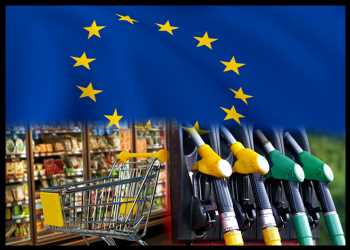Euro area consumer price inflation slowed to a four-month low in December on easing energy price growth, but an unexpected acceleration in core inflation pushes the case for the European Central Bank to continue with its hawkish stance.
Other economic data released on Friday suggested that recession is likely to be shallower than estimated previously. At the end of 2022, economic confidence strengthened to a four-month high on widespread improvements across trade, services, industry, and construction and among consumers.
Official data also showed a rebound in retail sales in November, underpinned by an upturn in non-food product turnover.
Consumer price inflation slowed more-than-expected to 9.2 percent in December from 10.1 in November, preliminary data from Eurostat revealed. Prices were forecast to rise 9.7 percent.
By contrast, core inflation that excludes energy, food, alcohol and tobacco, advanced to 5.2 percent from 5.0 percent in November. Economists had forecast the rate to remain stable at 5.0 percent.
With energy inflation dropping quickly and energy supply forecasts improving, 2 percent inflation could be reached much sooner than expected, ING economist Bert Colijn said.
Nonetheless, rising core inflation will be enough for the ECB to continue to hike interest rates, by 50 basis points in February and March, the economist noted.
Although the case of stagflation is not as acute as feared a few months ago, a technical recession is still likely, and the ECB is likely to raise its key policy rate to 3.00 percent in the coming months, Capital Economics’ economist Andrew Kenningham said.
Data showed that energy prices continued to log double-digit growth in December, up 25.7 percent. However, the rate of growth eased from 34.9 percent in November and 41.5 percent in October.
All other components of the harmonized index of consumer prices, namely food, alcohol and tobacco, non-energy industrial goods prices and services posted faster growth rates.
All big-four economies in the 20-nation currency bloc logged slower rates of inflation. The rate remained in double-digits only in Italy, where inflation eased to 12.3 percent in December from 12.6 percent in the previous month.
Harmonized inflation in Germany eased to 9.6 percent from 11.3 percent in November, thanks to a one-off measure by the government to share the monthly energy bill of the public.
France’s EU harmonized inflation slowed to 6.7 percent from 7.1 percent. Spain also posted a slower rate of 5.6 percent, down from 6.6 percent in the previous month.
The monthly survey by the European Commission showed that the economic confidence index rose more-than-expected to 95.8 in December from 94.0 in November. The latest score was the highest in four months and above economists’ forecast of 94.7.
Consumer sentiment was less negative at the end of the year, with the confidence indicator rising to -22.2, as initially estimated, from -23.9 in the previous month.
Eurostat reported that retail sales grew 0.8 percent month-on-month, in contrast to the 1.5 percent decrease in October, which was the biggest monthly decline since December 2021.
Non-food products turnover advanced 1.6 percent, while sales of food, drinks, and tobacco dropped 0.9 percent. Sales of automotive fuel in specialized stores grew 1.0 percent.
Retail sales through mail orders and the internet were 0.4 percent lower compared to last month.
On a yearly basis, retail sales declined 2.8 percent after falling 2.6 percent in October. Sales were expected to fall by 3.3 percent.
Source: Read Full Article
-
Energy hikes are bigger threat to UK pubs than Covid
-
$1.7 Bln Granted To Put 1700 American-built Buses For Transit Projects In 46 States
-
Jamie Reid Dies: Artist And Graphic Designer For The Sex Pistols Was 76
-
Dianne Feinstein Taken To Hospital For Brief Stay After Falling At Her Home
-
YouTube Won’t Remove Videos Claiming 2020 Election Was Stolen, But RFK Jr. Claims Instagram Ban For Campaign Site

